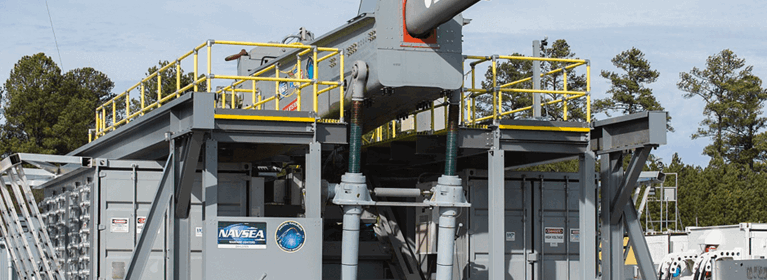
More Powerful & Faster Than Ever, the U.S. Navy Railgun Makes its Public Debut
Naval Surface Warfare Center
Government | Power & Motion Technology | by Bruce Crowder | 31 Aug 2017
From the muzzle-loading cannons of the USS Constitution to the Advanced Gun System on the U.S. Navy’s latest Zumwalt-class destroyers, naval warfare has always relied on explosives to fire projectiles at the enemy.
That could be about to change thanks to previously-secret research into electromagnetic railguns. Instead of carrying tons of high explosive in magazines, with all the attendant risk, warships could use electricity as a propellant in future guns.
Railguns use magnetic fields created by high electrical currents to accelerate a sliding metal conductor, or armature, between two rails. Instead of explosive shells, railguns fire inert projectiles that rely on kinetic energy for their effects.
The result is a weapon that eliminates the hazards of high explosives on a ship and unexploded ordnance on the battlefield.
FROM DRAWING BOARD TO FIRING RANGE
A proof-of-concept railgun, elevated by two Duff-Norton Mechanical Actuators (screw jacks), can accelerate a projectile up to Mach 6 and fire it more than 100 nautical miles. The U.S. Navy has been testing this Innovative Naval Prototype at the Naval Surface Warfare Centre, Dahlgren, Virginia.
Research into electromagnetic railguns has been going on since at least 2005, but the new prototype represents a significant milestone towards a deployable weapon. To build it, the Navy needed reliable components to adjust the elevation of the mounting that were capable of withstanding powerful recoil and exposure to harsh outside elements.
THE SOLUTION
Two 150T Screw Jacks with a 70" travel were installed with Anti-Backlash nuts, keyed with solid bar stock threaded ends to accommodate a double clevis fitment, 20 HP IP55 high-ratio gearmotor with encoder and brake, full/dual seals, limit switches/enclosure, and special lubrication, along with couplings and shafts to enable mechanical synchronization.
Ultimately, the railgun could be used to attack other ships, strike targets ashore or defend the ship against missiles and planes. Future developments will focus on increasing the rate of fire and the durability of the launcher.
‘The railgun is a true warfighter game changer,’ according to the Office of Naval Research. ‘Wide-area coverage, exceptionally quick response and very deep magazines will extend the reach and lethality of ships armed with this technology.’
Duff-Norton engineering is helping to turn this breakthrough technology into a reality.
Related Articles
Meeting the demand for a variety of bottle sizes to fit the vast array of packaged soft drinks and bottled waters can pose an extreme challenge on bottlers to quickly change from one package size to another. This forced them to find way to enhance beverage production flexibility by modifying the feeder system. A set of 4-ton M2555 Screw Jack actuators provided the mechanism needed to allow the operator to adjust for different bottle heights.

 APAC - English - EN
APAC - English - EN


